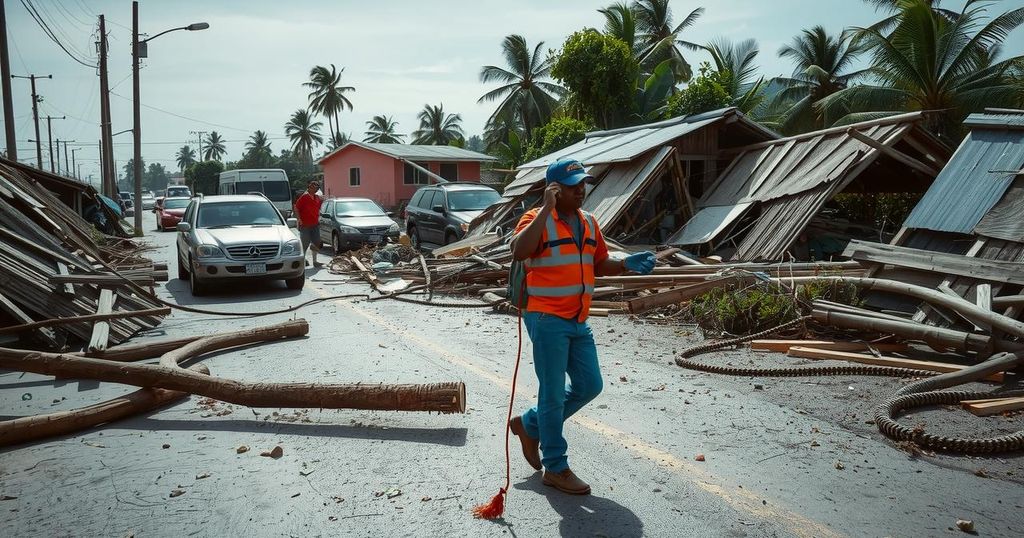World news
AFRICA, AM, CROSS, EMERGENCY RESPONSE, EMMANUEL MACRON, EUROPE, FRANCE, FRENCH RED CROSS, HURRICANE BERYL, IFRC, INTERNATIONAL FEDERATION OF RED CROSS AND RED CRESCENT SOCIETIES, MA, MAMOUDZOU, MAYOTTE, MOZAMBIQUE, NATURAL DISASTER, NATURAL DISASTERS, RED CROSS, SOUMAILA
Lena Nguyen
0 Comments
Rising Toll from Cyclone Chido in Mayotte and Mozambique: Humanitarian Crisis Unfolds
Tropical Cyclone Chido has caused widespread devastation in Mayotte and Mozambique, reporting a death toll of at least 22 in Mayotte and 34 in Mozambique, with over 200 Red Cross volunteers missing. The cyclone has led to significant infrastructural damage and heightened concerns regarding political and humanitarian responses in both regions.
The devastation caused by Tropical Cyclone Chido has resulted in significant human and material losses on the French overseas territory of Mayotte and in Mozambique. As reported by Ambdilwahedou Soumaila, the mayor of the capital city, Mamoudzou, the confirmed death toll in Mayotte has reached 22, with over 1,400 individuals injured. Authorities remain deeply concerned that the true number of fatalities could rise into the thousands due to unaccounted victims amid the chaos and destruction. The International Federation of Red Cross and Red Crescent Societies has indicated that over 200 of its volunteers are currently missing, raising further alarms regarding the magnitude of the disaster.
The cyclone, packing winds up to 220 kilometers per hour, hit Mayotte on Saturday and left large areas isolated. Reports indicate that many bodies of victims may not have been retrieved or counted amid the ongoing response efforts. Emergency services are racing to address the immediate needs of survivors, as officials express concerns about potential health crises stemming from the lack of food, water, and electricity. The French government is coordinating relief efforts, stating that assistance in the form of food and water will begin arriving imminently.
On Tuesday, the French government announced a curfew to maintain order amidst the unpredictable circumstances. Locals have raised the issue of the undocumented migrants in the region, who are perhaps the most severely affected by the cyclone’s aftermath. Estelle Youssouffa, a local politician, highlighted that many of these individuals did not seek shelter during the storm due to their fears of deportation, potentially complicating rescue and recovery operations.
French President Emmanuel Macron is scheduled to visit Mayotte soon, amidst rising political tensions regarding immigration and how France manages its territories. Following Cyclone Chido’s blow, Macron’s visit is expected to address immediate relief efforts while also navigating the contentious political climate regarding legal and illegal immigrations, which has been a source of unrest in the region.
After battering Mayotte, Cyclone Chido continued its path to Mozambique, leading to additional fatalities and damage. The UN Office for the Coordination of Humanitarian Affairs reported that 34 people have died in Mozambique, where winds reached speeds of up to 260 kilometers per hour. The cyclone has devastated the region, destroying nearly 23,600 homes and significant infrastructure, exacerbating an already challenging humanitarian situation.
Tropical Cyclone Chido emerged as a catastrophic event impacting Mayotte, an impoverished French archipelago, and Mozambique. With winds reaching catastrophic speeds, it has caused severe destruction, particularly in low-income areas. The cyclone’s impact has led to concerns about humanitarian crises in both locations, with significant reports of missing individuals, especially humanitarian workers. Local officials voice fears over underreporting the actual death toll due to chaos post-storm, and the political implications of the disaster further complicate the response efforts. Beyond the immediate disaster, the situation highlights broader issues surrounding climate change, immigration, and the preparedness of local governments.
In summary, Cyclone Chido has wrought immense destruction across Mayotte and Mozambique, with rising death tolls and alarming numbers of missing individuals, particularly among humanitarian workers. As authorities scramble to provide food, water, and shelter, the broader implications of this disaster are prompting political scrutiny of immigration policy and disaster preparedness. The combined efforts of local, national, and international authorities will be crucial in addressing the immediate and long-term needs of affected communities.
Original Source: www.abc.net.au




Post Comment